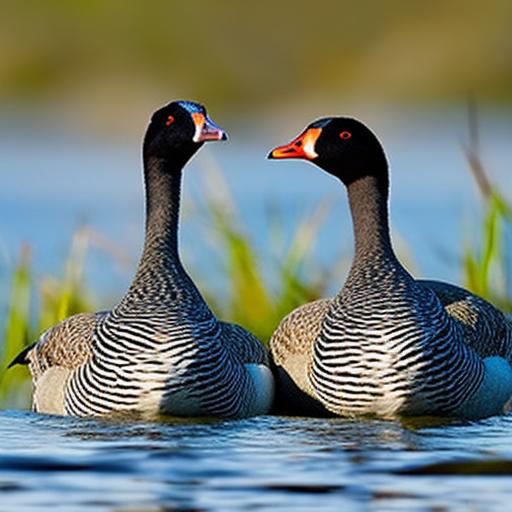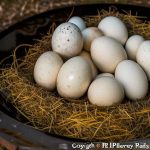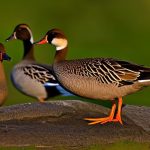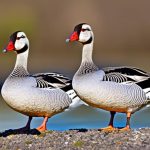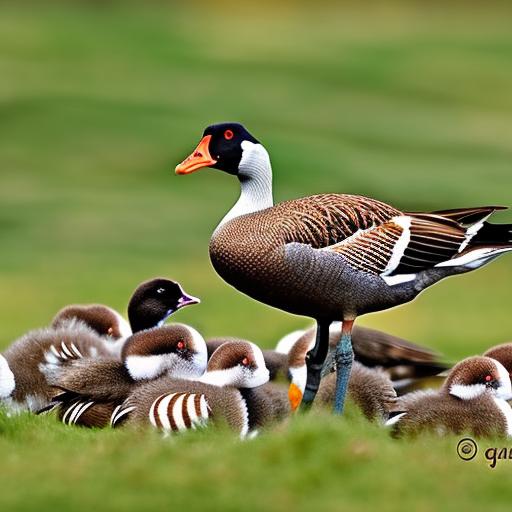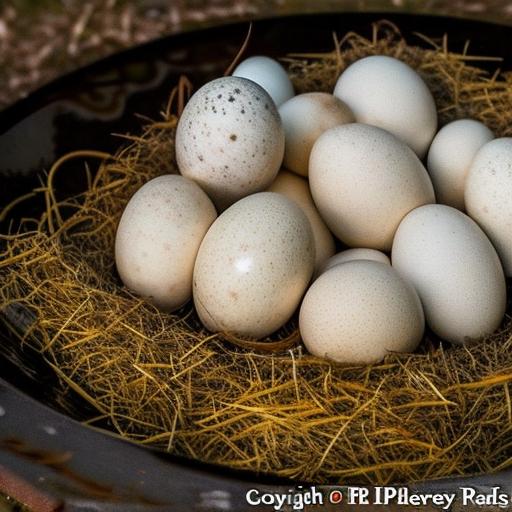Breeding geese is a popular practice among farmers and hobbyists alike. Geese are known for their meat, eggs, and feathers, making them a valuable addition to any farm or backyard. They are also known for their ability to act as natural pest control, as they eat insects and weeds. Breeding geese can be a rewarding experience, but it requires knowledge and careful planning to be successful.
People breed geese for various reasons. Some breeders focus on producing high-quality meat or eggs for consumption, while others breed geese for their feathers or as show birds. Geese can also be bred for conservation purposes, as some breeds are endangered or at risk of extinction. Additionally, geese can be bred as pets or for their ability to guard property.
There are several benefits to breeding geese. Firstly, geese are relatively low-maintenance animals compared to other livestock. They are hardy and adaptable, able to withstand various climates and environments. Geese are also efficient grazers, making them cost-effective to feed. Furthermore, geese have a long lifespan and can continue to produce offspring for many years, providing a sustainable source of meat, eggs, or feathers.
Key Takeaways
- Breeding geese can be a rewarding and profitable venture.
- Avoiding deadly mistakes is crucial for the health and safety of your geese.
- Selecting the right breeding stock is important for genetic diversity and desirable traits.
- Creating a safe and healthy environment with proper nutrition and water is essential for successful breeding.
- Proper management of breeding cycles, incubation, and health issues is necessary for a successful and ethical breeding program.
Understanding the Importance of Avoiding Deadly Mistakes
Novice breeders often make common mistakes that can have serious consequences for the health and well-being of their geese. One common mistake is overcrowding the birds in a small space. This can lead to stress, aggression, and the spread of diseases. Another mistake is not providing adequate protection from predators. Geese are vulnerable to attacks from predators such as foxes, raccoons, and dogs.
These mistakes can have dire consequences for the geese. Overcrowding can lead to the spread of diseases such as avian influenza or botulism. Lack of protection from predators can result in injury or death of the geese. It is important for breeders to be aware of these potential pitfalls and take steps to avoid them.
To avoid making these mistakes, breeders should ensure that they have enough space for their geese to roam and graze. A general rule of thumb is to provide at least 20 square feet of space per goose. Additionally, breeders should invest in secure fencing and housing to protect the geese from predators. Regular veterinary check-ups and vaccinations can also help prevent the spread of diseases.
Selecting the Right Breeding Stock
Selecting the right breeding stock is crucial for successful geese breeding. Breeders should look for certain characteristics in their geese to ensure that they are healthy and capable of producing quality offspring. These characteristics include good body conformation, strong legs and feet, and a healthy coat of feathers. The geese should also have a calm and friendly temperament.
When choosing breeding stock, breeders should avoid birds that show signs of illness or deformities. They should also avoid birds that are too old or too young to breed. It is important to select geese from different bloodlines to maintain genetic diversity within the flock. This can help prevent inbreeding and improve the overall health and vigor of the offspring.
Quality breeding geese can be found from reputable breeders or through poultry shows and auctions. It is important to do thorough research and ask for recommendations before purchasing breeding stock. Breeders should also inspect the birds in person before making a purchase to ensure that they meet the desired criteria.
Creating a Safe and Healthy Environment for Your Geese
Creating a safe and healthy environment for your geese is essential for their well-being and productivity. Geese require access to clean water, shelter, and adequate space to roam and graze. They are also sensitive to extreme temperatures, so it is important to provide them with shade in hot weather and protection from cold winds in the winter.
To create a safe and healthy environment, breeders should provide a secure and predator-proof enclosure for their geese. This can be achieved through the use of sturdy fencing and housing. The enclosure should also have access to fresh water for drinking and bathing. It is important to regularly clean and refill the water source to prevent the spread of diseases.
Breeders should also provide a balanced diet for their geese. Geese require a diet that is high in protein, vitamins, and minerals. This can be achieved through a combination of commercial feed, fresh greens, and grains. It is important to monitor the geese’s weight and adjust their diet accordingly to prevent obesity or malnutrition.
Providing Proper Nutrition and Water
Proper nutrition and access to clean water are essential for the health and productivity of geese. Geese require a balanced diet that includes protein, vitamins, minerals, and carbohydrates. A diet that is lacking in any of these nutrients can lead to poor growth, reduced egg production, or other health issues.
Commercial poultry feed is a convenient option for providing geese with the necessary nutrients. There are different types of feed available for different stages of growth, such as starter feed for goslings and layer feed for adult geese. It is important to choose a high-quality feed that is specifically formulated for geese.
In addition to commercial feed, geese should also have access to fresh greens and grains. Fresh greens such as grass, lettuce, and spinach provide additional vitamins and minerals. Grains such as corn or wheat can be offered as a treat or supplement to the geese’s diet.
Clean water is also crucial for the health of geese. Geese require water for drinking and bathing. The water source should be clean and free from contaminants such as algae or bacteria. It is important to regularly clean and refill the water source to ensure that it remains fresh and safe for the geese.
Managing Breeding Cycles and Incubation
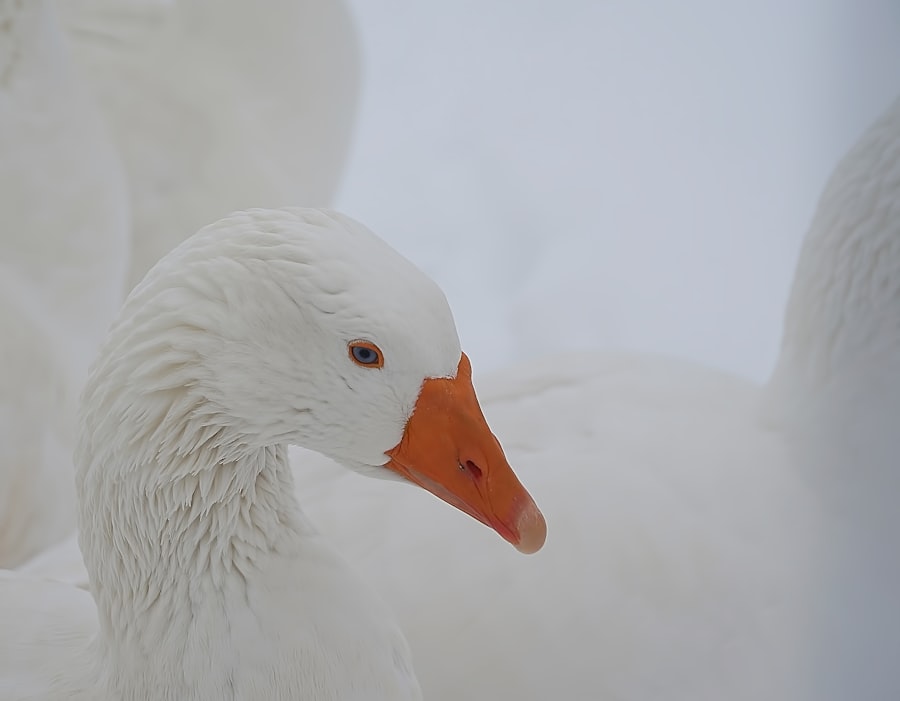
Understanding the breeding cycle of geese is important for successful breeding. Geese are seasonal breeders, meaning they are most fertile and likely to mate during certain times of the year. The breeding season for geese typically occurs in the spring, although some breeds may breed earlier or later in the year.
To manage breeding cycles, breeders should ensure that their geese are in good health and condition before the breeding season begins. This includes providing them with a balanced diet, access to clean water, and a safe and comfortable environment. It is also important to monitor the geese for signs of readiness to breed, such as increased vocalization or aggression.
Once the geese have mated, the female will lay eggs and begin incubating them. Geese are known for their strong maternal instincts and will diligently care for their eggs. However, some breeders may choose to artificially incubate the eggs to increase hatch rates or control breeding outcomes.
Artificial incubation involves placing the eggs in an incubator and controlling temperature and humidity levels to mimic natural conditions. This requires careful monitoring and adjustment of these factors throughout the incubation period. Breeders should also be prepared to assist with hatching if necessary, as some goslings may have difficulty breaking out of their shells.
Preventing and Treating Common Health Issues
Geese are generally hardy animals, but they can still be susceptible to certain health issues. Common health issues in geese include respiratory infections, parasites, and foot problems. These health issues can be prevented through proper nutrition, hygiene, and regular veterinary care.
To prevent respiratory infections, breeders should provide a clean and well-ventilated environment for their geese. Regular cleaning of housing and removal of droppings can help prevent the spread of bacteria or viruses. It is also important to monitor the geese for signs of illness, such as coughing, sneezing, or difficulty breathing.
Parasites such as mites or worms can also affect the health of geese. Regular deworming and treatment for external parasites can help prevent infestations. Breeders should also provide a clean and dry environment to discourage the growth of parasites.
Foot problems are common in geese, especially if they are kept on hard or wet surfaces. Breeders should provide a soft and dry surface for the geese to walk on, such as grass or straw. Regular inspection of the geese’s feet can help identify and treat any issues before they become serious.
Avoiding Inbreeding and Maintaining Genetic Diversity
Maintaining genetic diversity is important for the long-term health and productivity of a flock. Inbreeding, or breeding closely related individuals, can lead to a decrease in genetic diversity and an increase in the likelihood of genetic disorders or reduced fertility.
To avoid inbreeding, breeders should keep detailed records of their geese’s lineage and breeding history. This can help identify potential matches that will maintain genetic diversity within the flock. Breeders should also consider introducing new bloodlines into their flock periodically to prevent inbreeding.
Maintaining genetic diversity can also be achieved through selective breeding. Breeders should select breeding stock based on desirable traits such as size, color, or temperament. By carefully selecting which geese to breed, breeders can improve the overall quality of their flock while maintaining genetic diversity.
Understanding the Legal and Ethical Considerations of Breeding Geese
Breeding geese may be subject to certain legal considerations depending on the jurisdiction. It is important for breeders to familiarize themselves with local laws and regulations regarding the breeding and keeping of geese. This may include obtaining permits or licenses, adhering to zoning restrictions, or following specific animal welfare guidelines.
Ethical considerations should also be taken into account when breeding geese. Breeders should ensure that their geese are provided with a safe and comfortable environment, access to proper nutrition and water, and appropriate veterinary care. They should also consider the long-term welfare of the geese and avoid practices that may cause unnecessary harm or suffering.
To ensure responsible breeding practices, breeders should stay informed about current research and best practices in geese breeding. They should also seek guidance from experienced breeders or poultry associations. By staying educated and following ethical guidelines, breeders can contribute to the overall well-being of their geese and the sustainability of the breed.
Tips for Successful and Safe Geese Breeding
Breeding geese can be a rewarding and profitable endeavor, but it requires knowledge, planning, and dedication. By understanding the importance of avoiding deadly mistakes, selecting the right breeding stock, creating a safe and healthy environment, providing proper nutrition and water, managing breeding cycles and incubation, preventing and treating common health issues, avoiding inbreeding, and understanding the legal and ethical considerations of breeding geese, breeders can increase their chances of success.
Some additional tips for successful and safe geese breeding include:
1. Regularly monitor the health and behavior of your geese to catch any issues early on.
2. Provide enrichment activities such as toys or access to natural grazing areas to keep your geese mentally stimulated.
3. Practice good biosecurity measures to prevent the spread of diseases between your geese and other animals.
4. Keep detailed records of your breeding program to track the performance and lineage of your geese.
5. Continuously educate yourself about geese breeding through books, online resources, or workshops.
Breeding geese can be a fulfilling and profitable venture for those who are willing to put in the time and effort. With proper care, attention to detail, and a commitment to responsible breeding practices, breeders can enjoy the benefits of a healthy and productive flock of geese.
If you’re interested in breeding geese, it’s important to educate yourself on the best practices and avoid any deadly mistakes. One article that can provide valuable insights is “Avoid Deadly Mistakes: A Guide to Breeding Geese Safely” available at https://poultrywizard.com/keeping-chickens/chicken-coop-portage/. This comprehensive guide covers everything from selecting the right breed to creating a suitable environment for your geese. By following the advice in this article, you can ensure a successful and safe breeding experience for your geese.
FAQs
What are some common mistakes to avoid when breeding geese?
Some common mistakes to avoid when breeding geese include overcrowding, improper nutrition, lack of clean water, and inadequate shelter.
How many geese should be kept in a breeding flock?
A breeding flock of geese should consist of one gander and two to six females. Keeping too many geese in a breeding flock can lead to overcrowding and aggression.
What should be included in a goose’s diet during breeding season?
During breeding season, a goose’s diet should consist of high-quality protein sources such as soybean meal, fish meal, or alfalfa meal. They should also have access to fresh greens and clean water.
What kind of shelter is necessary for breeding geese?
Breeding geese require a shelter that is dry, well-ventilated, and protected from predators. The shelter should also have nesting boxes for the females to lay their eggs.
How often should breeding geese be checked for health issues?
Breeding geese should be checked for health issues on a regular basis, at least once a week. Signs of illness include lethargy, loss of appetite, and abnormal droppings. Any sick birds should be isolated and treated immediately.
Meet Walter, the feathered-friend fanatic of Florida! Nestled in the sunshine state, Walter struts through life with his feathered companions, clucking his way to happiness. With a coop that’s fancier than a five-star hotel, he’s the Don Juan of the chicken world. When he’s not teaching his hens to do the cha-cha, you’ll find him in a heated debate with his prized rooster, Sir Clucks-a-Lot. Walter’s poultry passion is no yolk; he’s the sunny-side-up guy you never knew you needed in your flock of friends!

